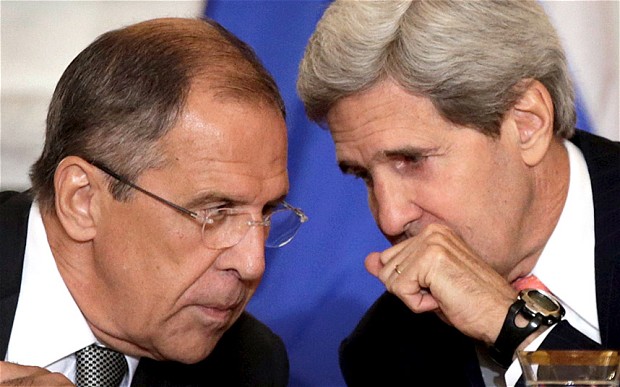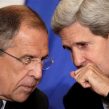
Obama Administration Placates Russia on Ukraine
Publication: Eurasia Daily Monitor Volume: 12 Issue: 150
By:

Diplomacy by the United States and Western Europe has recently intensified pressure on Ukraine to legitimize the Russian-controlled Donetsk and Luhansk “people’s republics” (see EDM, July 31). Meanwhile, Moscow has almost fallen silent on this issue at the official level. Until the end of June, President Vladimir Putin and Foreign Affairs Minister Sergei Lavrov were relentlessly asking Ukraine to enshrine the status of Donetsk-Luhansk in Ukraine’s constitution and validate the upcoming elections in that Russian-controlled territory. At present, however, Moscow is allowing Western diplomacy to cajole Kyiv into compliance.
Russia recognizes that it could never, on its own, persuade Ukraine to legitimize and legalize the “DPR-LPR.” Only the main Western players, first and foremost Washington, might possibly move Kyiv to do so. The Kremlin openly recognized this reality when it activated the Grigory Karasin–Victoria Nuland diplomatic channel at the deputy ministerial level (see EDM, July 20, 24).
US Secretary of State John Kerry held talks with Lavrov in Qatar, on August 3, and in Kuala Lumpur (on the sidelines of the meeting of the Association of Southeast Asian Nations—ASEAN), on August 5, regarding the Middle East and Ukraine. Such “package” discussions are inherently disadvantageous and potentially risky to Ukraine. Kerry told the press that he and Lavrov discussed the “differences in their views about the Minsk agreements as regards the conditions for holding local elections and constitutional reform in Ukraine.” He and Lavrov agreed to create Russian and US working groups for “in-depth discussions,” initially by Moscow-Washington video-conferences, about “advancing the negotiations to defuse the ‘crisis in Ukraine’ ” (Ukrinform, Ukraiynska Pravda, August 7).
According to Lavrov, there have been four meetings between Karasin and Nuland thus far, as well as a number of telephone conversations between them. Lavrov will continue discussions with Kerry and through their respective working groups about “the special status for the Donbas region and the local elections in the proclaimed republics” (Interfax, August 7).
Kerry has repeatedly sought a bilateral compromise with Moscow over “the Ukraine crisis.” He fell repeatedly into Lavrov’s traps (April 2014 in Geneva; May 2015 in Sochi). If the latest Kerry-Lavrov idea materializes, it would upgrade and institutionalize what is now the Karasin-Nuland channel. This evolving bilateral format would advance bilateral negotiations about Ukraine in Ukraine’s absence. Moreover, it would allow Russia’s autocracy to pass judgment on Ukraine’s constitutional reform and the local elections that might qualify Donetsk-Luhansk for legal status.
For the Barack Obama administration to promote democracy in Ukraine and, at the same time, to discuss Ukraine’s constitution and elections with Russia is a contradiction in terms.
In all existing formats (“Normandy” quartet, Minsk Contact Group, Karasin-Nuland channel or the proposed Kerry-Lavrov upgrade) the diplomatic process concentrates on enshrining the “DPR-LPR” in Ukraine’s constitution and providing a legal cover for local elections in that Russian-occupied territory (see EDM, August 3, 4, 6). Western diplomacy labors under self-generated pressures to implement those political clauses of the Minsk Two armistice by December 2015, the Kremlin’s arbitrary deadline.
Publicly at least, not one Western policymaker or diplomat has attempted to connect the “implementation of Minsk Two” with some basic Western strategy or policy framework regarding Ukraine (or Europe’s East writ large). Instead, implementing Minsk Two has seemingly become a Western diplomatic goal per se, irrespective of merits, subordinated to a calendar deadline, and tacitly linked to the West’s future relations with Russia.
Neither Washington nor Berlin or Brussels are clearly telling Kyiv how they expect the situation to develop if, or when, Kyiv legitimizes local elections in Donetsk-Luhansk and enshrines their status in Ukraine’s constitution (the political clauses of Minsk Two). Apparently the United States, Germany and the European Union have no clear idea themselves about “what next.”
Vaguely and non-committally, some Western officials sometimes suggest that Ukraine’s political compliance with Minsk Two could lead to Russia’s compliance with the military clauses of that armistice. The two-fold hope and wish is: a) evacuation of Russian military forces from what is legally Ukraine’s territory; and b) restoration of Ukraine’s sovereignty over a 400-kilometer sector of Ukraine’s border with Russia.
Those goals, however, are illusory under the terms of Minsk Two. That armistice allows no scope for trading off Ukrainian compliance with the political clauses in return for Russian compliance with the military clauses. Moscow has incurred no such obligation in this document, which it wrote itself. All the “obligations” fall on Ukraine under the letter of this diktat.
Meanwhile, the Kremlin denies with utmost finality the fact of its military presence in Ukraine’s east. Russia is already re-flagging its military presence under “DPR-LPR” colors. And restoration of Ukrainian sovereignty on the border is explicitly conditional on an agreement between Kyiv and Donetsk-Luhansk under the terms of Minsk Two. This means no Ukrainian sovereign control, but some form of shared control, and only after a constitutional deal with Donetsk-Luhansk.
Western powers might hypothetically compel Russia to withdraw its troops from Ukraine through a more stringent application of economic sanctions. Such a process would have to take place outside the framework of the Minsk Two armistice—in effect, to override the Minsk terms. The mood in the West, however, does not indicate full resolve on economic sanctions.
According to some Western diplomats (most recently Nuland in Kyiv), if only Ukraine “fulfills its obligations” under Minsk Two, i.e., it compromises on the constitution and local elections, then the West (mainly, the US) could more effectively call on Russia to withdraw the troops and allow Ukraine to regain control of the border. These are talking points that guarantee nothing, since no such reciprocity exists under the Minsk terms. If anything, Donetsk-Luhansk would gain a stronger bargaining position, once endowed with a constitutional status. Even after a constitutional compromise, Ukraine would end up in a position similar to that of Georgia or Moldova, calling in vain for Russia to remove its military presence.
Western diplomats’ latest hope and wish is that “legitimate representatives” of Donetsk-Luhansk might be elected in October, with whom Ukraine would then negotiate that territory’s constitutional status. No one, however, is seriously suggesting that such representatives would replace the “DPR-LPR” leaders after the local elections there. The Ukrainian authorities are, instead, seriously concerned that pro-Russia candidates might be elected even in the liberated parts of the Donetsk and Luhansk provinces, which are widely exposed to Russian propaganda and infiltration (Ukrinform, July 31, August 2, 8; UNIAN, August 7).
In the Russian-controlled territory, it is the “DPR-LPR” leaders who are organizing these elections. Those leaders are negotiating in the Minsk Contact Group about the modalities of elections, and are fully controlling the process locally. Those “presidents” and “parliaments” are not up for re-election. Only the district-, town- and village-level councils and mayors are to be elected. And not one Western official is in a position to tell Ukraine that the “DPR-LPR,” with their armies and security services, would be dismantled, if and when elections are staged in that territory and validated internationally. Quite the contrary, the “DPR-LPR” and Moscow would, in that case, wield a stronger hand in the negotiations with Kyiv.
In sum, Ukraine is being asked to sacrifice the integrity of its elections and its constitutional processes for no tangible gain in terms of sovereignty or security. No such deal is available. President Petro Poroshenko understood this conclusively when promulgating the law on elections. This precludes Ukraine’s consent to the staging of local elections in the “DPR-LPR” (see EDM, August 6).
Ukraine will have to, however, brace for more insistent demands to comply with Minsk Two unilaterally, while the diplomatic clock ticks toward December’s artificial deadline. Western diplomacy is itself captive to Minsk Two and seems unable to look beyond it.




